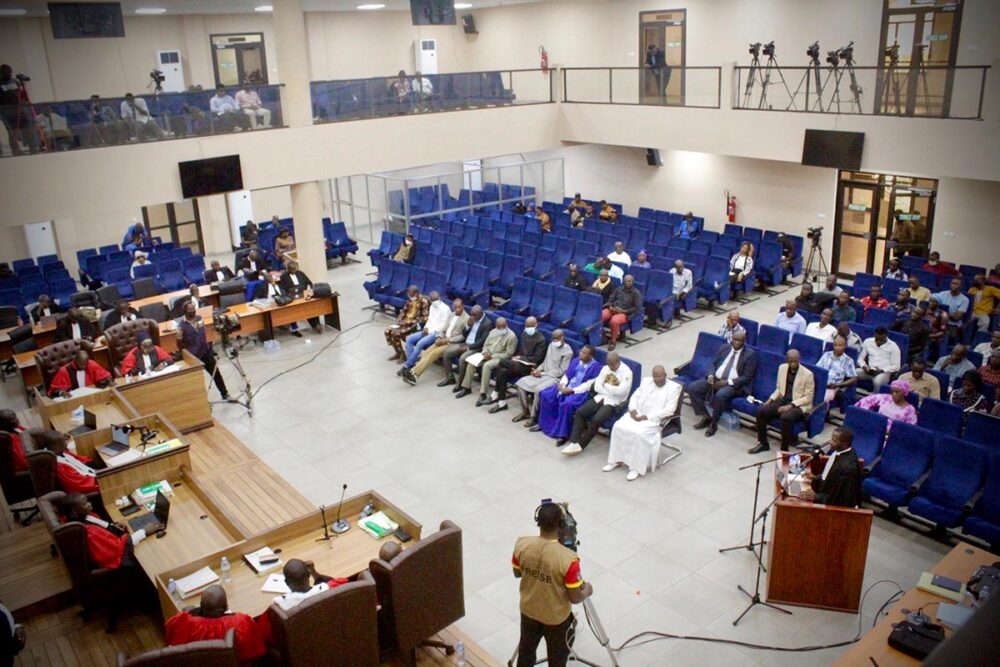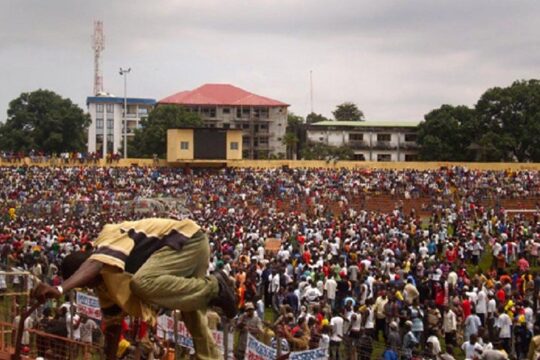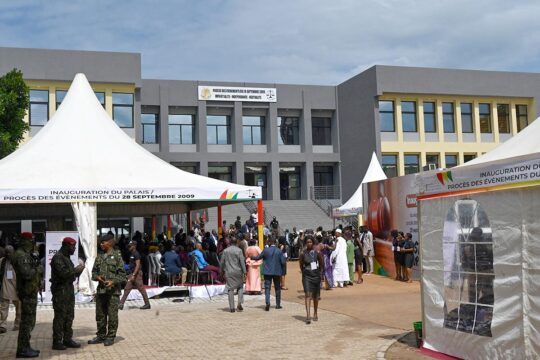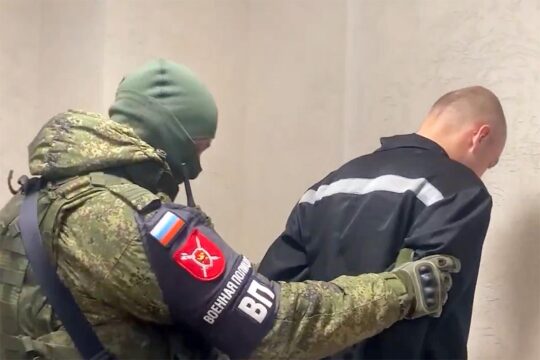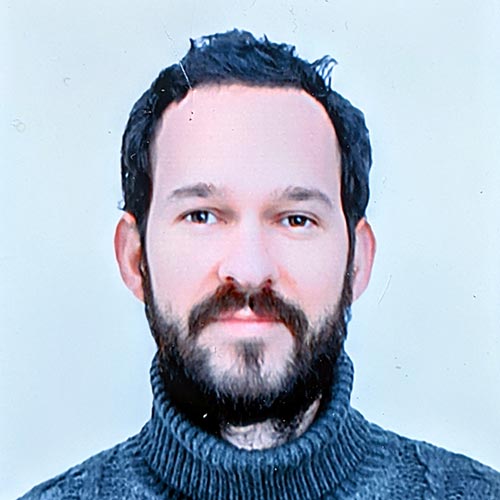Algassimou Diallo's voice does not tremble at the microphone. On Wednesday 22 May, in his red robe with its ermine collar, the prosecutor in the September 28, 2009 massacre trial begins to read out his closing arguments. The case is extraordinary, he points out: “This is the first time that mass crimes are tried in Guinea, the first time a former head of state is on trial.”
For the closing arguments, Moussa Dadis Camara and his co-defendants are out of the dock; they are seating in front of the court, as close as possible to the lawyers and magistrates. They are being prosecuted for the repression of an opposition rally on September 28, 2009 and in the days that followed. More than 150 people were shot or stabbed to death by a force made up of members of the presidential guard, gendarmes and militiamen acting under orders of the then junta, the National Council for Democracy and Development (CNDD), according to a report of a UN commission of inquiry.
Dadis Camara unmoved
At the start of his speech, the prosecutor calls for the murders, assassinations, tortures, kidnappings and rapes to be reclassified as crimes against humanity. Against Dadis Camara, the main defendant, who is suspected of having ordered the massacre, he asks for life imprisonment, with a minimum recommendation of 30 years. The former president remained unmoved. The eyes of the other defendants roll from left to right. Their look is filled with concern as the other requests for sentences are handed down one after the other. Life imprisonment is also demanded against several senior members of the junta: Moussa Tiegboro Camara, the former head of the anti-drug unit; Abdoulaye Cherif Diaby, the former health minister; Marcel Guilavogui, Dadis Camara's protégé; Blaise Goumou, a gendarme who was a member of the anti-drug unit; and Claude Pivi, the former presidential security minister, who is currently on the run, as well as Alpha Amadou Baldé who is also at large.
“Requisitions are commensurate with the serious crimes committed. Requesting life sentences for seven of the accused is a good signal that shows it is unacceptable for the perpetrators not to be punished,” said Alpha Amadou DS Bah, coordinator of the victims' lawyers' collective. Now, he hopes the judges will confirm these sentences, since they can’t “aggravate” them.
A 15 year jail sentence requested against Toumba
Dadis Camara is “serene”, says his lawyer, Pépé Antoine Lamah. “He is firmly convinced that the court will rule in favour of the law and that he will inevitably be acquitted.” The lawyer is up in arms about what was said about his client during this last phase of the civil parties' pleadings and closing arguments, which lasted two weeks: “We deplore the paucity, both in terms of evidence and legal arguments, of the statements made by the prosecution.” In particular, he criticises the prosecution's request for the facts to be reclassified as crimes against humanity, which he says is unjustified.
The superstar defendant, Aboubakar Diakité, Dadis Camara's former aide-de-camp – some of whose comments are now memes on the Internet – still enjoys great sympathy in Guinean public opinion, but also well beyond, throughout the sub-region. By agreeing to tell “his part of the truth”, he has won the support of the public and broken the law of silence that had plagued the case until now. As for the man nicknamed “Toumba”, the public prosecutor has chosen to be more lenient, opting for a fifteen-year prison sentence.
While the civil parties' lawyers insisted during their closing arguments on Toumba's active role in the massacre, one of them, Alsény Aïssata Diallo, called for his acquittal. In the end, however, the prosecution opted for a heavy sentence. “He helped save the leaders and helped the court see things more clearly. What we wouldn't have accepted, would have been to see the prosecution not seek any sentence for him,” explains Bah. “The victims are very relieved, they are waiting for the court to confirm these sentences and to rule on the compensation claims we have made.” The lawyer is asking for 100,000 to 300,000 euros in compensation, depending on the damage. These sums, he says, should be guaranteed by the Guinean state.
Fifteen years of prison have also been sought against Ibrahima Camara aka Kalonzo, and Paul Mansa Guilavogui, two soldiers of no real stature. And finally the prosecutor was the most magnanimous with Toumba's former bodyguard, Cécé Raphaël Haba, and Mamadou Aliou Keïta: he demanded fourteen years of imprisonment for both, even though Aliou Keïta was accused of rape by a victim who formally recognised him. The prosecutor denied all the defendants mitigating circumstances.
Dadis Camara loses his cool
The closing arguments caused some confusion in the minds of some Guineans, starting with those in the courtroom. “The defendants were shocked; they thought it was the sentence that had been handed down. It took them several minutes of explanation to understand that it wasn't over,” recounts Bah. While the prosecution's closing arguments were delivered in one day, it took civil parties' lawyers five days of hearings to plead their case. The quality of the pleadings varied, but they were sometimes powerful.
On May 14, Bah managed to unsettle Dadis Camara, who lost his composure. As he recounted the political context of the massacre, the lawyer said: “There was popular support for the seizure of power [by the CNDD junta], because Captain Moussa Dadis Camara was seen as a liberator, someone who, had he been honest and sincere, could have led this country towards development and free and transparent elections.” At these words, the former head of state burst out. He stood up and shouted: “He must rectify his language!” The accused was immediately admonished by the president of the court.
The emotion was also palpable during Halimatou Camara's closing arguments on May 21. The lawyer, who wanted to talk about “the suffering of the victims”, had a trembling voice when she recalled the fate of a woman who had been raped at the stadium. The woman, who testified in court, recounted how she crossed Toumba's path on September 28,2009. As she was dragged on the ground by soldiers, the man who was at the time the head of the presidential guard did not intervene. Further on, she was raped, with the barrel of a rifle inserted into her genitals.
Tensions within the defense
The next day, deputy prosecutor Elhadj Sidiki Camara concluded his closing arguments by evoking the tragic fate of a woman who had become a sexual slave for the military. He broke down and sobbed into the microphone. “It is not reason, but passion, that guided these closing arguments,” replied Lamah. “The proof of this is that a deputy public prosecutor ended up bursting into tears as if he had lived through the events, to the point of accepting the statements of a civil party as if they were the gospel; he completely failed in his mission.” He added: “When you are the public prosecutor, you represent the society; the defendants against whom false accusations have been made are part of the society.”
Defense arguments began on Monday May 27. Around twenty lawyers are due to take the stand. This final phase before the verdict could take up to four weeks, according to the civil parties, with tensions looming over the order of appearance, as Dadis Camara's and Toumba's lawyers all want to plead last so that they can best defend their client against the attacks from the other side. The president of the court, Ibrahima Sory II Tounkara, hopes the defendants will know their fate before the court's recess, which begins in August.


